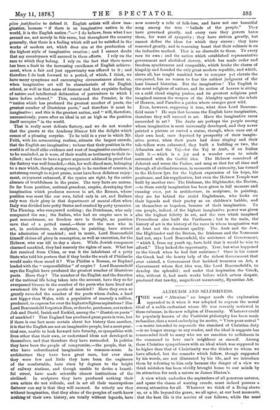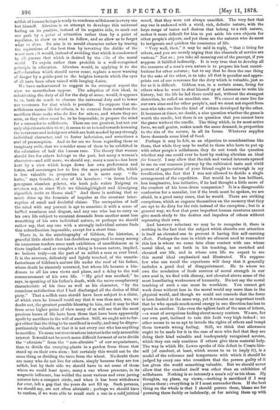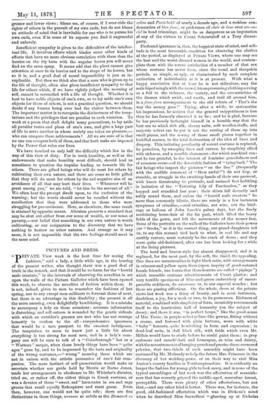ALTRUISM AND SELFISHNESS.
THE word " Altruism " no longer needs the explanation appended to it when it was adopted to express the moral ideal of a noble enthusiast whose life was recently reviewed in these columns, in the new religion of Humanity. Whatever could be popularly known of the Positivist philosophy has been made so familiar, that a word embodying its motto, "Vivre pour autrui "
— a motto intended to supersede the standard of Christian duty — is no longer strange to any reader, and the ideal it suggests has commended itself to many who see no sanction to selfishness in the command to love one's neighbour as oneself. Among these Christian sympathisers with an ideal which was supposed to be higher than that of Christianity was the thinker to whom we have alluded, but the remarks which follow, though suggested by his words, are not illustrated by his life, and we introduce them by referring to him only because the danger of a view we think mistaken has been vividly brought home to our minds by its attraction for such a nature as James Hinton's.
A view which embodies the aspirations of all generous natures, • and spans the chasm of warring creeds, must indeed possess a strong attraction for all. Whatever we think of a Being above us, or a life beyond the grave, we all agree, at our best moments, that the best life is the service of our fellows, while the most
selfish of human beings is ready to condemn selfishness in every one but himself. Altruism is an attempt to develope this universal feeling on its positive, instead of its negative aide, to mark out our path by a point of attraction rather than by a point of repulsion, to show us what to follow, and so allow us to forget what to shun. Its aim is to mould character rather by tracing the aspirations of the best than by inverting the dislike of the worst men ; it would, instead of avoiding that which is condemned by all, pursue that which is desired by the elite of the moral world. To enjoin rather than prohibit is a well-recognised principle in education. Altruism would, in applying it to the self-education which should never cease, replace a mere warning of danger by a guide-post to the heights towards which the eyes of all have been often raised with longing desire.
We have endeavoured to suggest in its strongest aspect the view we nevertheless oppose. The adoption of this ideal, in substituting the duty of all for the duty of some, would, it appears to us, both do much to obscure the universal duty and to lower our reverence for that which is peculiar. To suppose that un- selfishness means life for others, is to conceal from ourselves the sacrifices those make who do live for others, and where they are I seen, as they often must be, to be impossible, to prepare the mind I for a surrender to selfishness. These are our greatest, but not our only objections to this view ; it seems to us to tend towards lessening the reverence and indulgence which are both needed by any strongly individual character, and to foster indecision, and sometimes a sort of presumption. And so far are we from regarding these as imaginary evils, that we consider some of them to be exhibited in ' the education of half the human race. 'rile theory that woman should live for others belongs to the past, but many a woman's character—and still more, we should say, many a man's—bas been hurt by a view which keeps down her own preferences and tastes, and encourages her to live the mere parasitic life, which is less valuable in proportion as it is more easy. " Sie hatte," says Goethe, of one of his heroines : "in ihrem Leben genugsam einsehen gelernt, win hoch jede wahre Neigung zu schtitzen sey, in einer Welt wo Gleichgtiltigkeit and Abneigung eigentlich recht zu Hause sind." And there is nothing that so much dries up the fountain of impulse as the constant inter- ruption of small and doubtful claims. The occupation of half the mind with any pursuit is apt to associate it with a sense of I baffled weariness and disgust, and any one who has to carry on his own life subject to constant demands from another must lose something of his own individual nature, or perhaps we should rather say, that any one with a strongly individual nature finds this subordination impossible, except for a short time.
There is, in the autobiography of Gibbon, the historian, a graceful little sketch that has doubtless suggested to many among its numerous readers some such exhibition of unselfishness as is there implied—and so complex a thing is human nature, implied, we believe truly—on the part of as selfish a man as ever lived. It is the account, delicately and lightly touched, of the unsatis- factoriness of Gibbon's mature life under the roof of his father, whose death he sincerely mourned, but whose life became a hin- drance to all his own views and plans, and a delay to the real commencement of his own life. "My grief was soothed," he says, in speaking of his father's death, with the naive complacency characteristic of his time as well as his character, "by the conscious satisfaction that I had discharged all the duties of filial piety." That a selfish man should have been subject to a claim, of which even he himself could say that it was thus met, was, we doubt not, the greatest possible blessing to him, and it may be that from some higher point of view many of us will see that the most precious hours of life have been those that have been apparently spoilt by sacrifices to the will of another. Still, we ought not to for- get either that the thing to be sacrificed is really, and may be dispro- portionately valuable, or that it is not every one who has anything to sacrifice. To some naturesvicarious interest is the only accessible interest. It would not be much more difficult for most of us to divide the " altruists " from the " non-altruists " of our acquaintance, than to divide the creeping-plants in a garden from those that stand up on their own stem ; but certainly this would not be the same thing as dividing the tares from the wheat. No doubt there are many who do not live for others, simply because they are too selfish, but by their side we should have to set some of those whom we could least spare, many a one whose presence, in its magnetic influence, has welded the moat various and even jarring natures into a compact circle, and when it has been withdrawn for ever, left a gap that the years do not fill up. Such persons, we should say, are not often altruistic ; perhaps we should have to confess, if we were able to recall such a one in a cold:critical
mood, that they were not always unselfish. The very fact that , any one is endowed with a vivid, rich, definite nature, with the large range of tastes and desires that belong to a rich nature, makes it more difficult for him to put aside his own objects for other people's objects, and yet these are the natures who do most to invigorate and quicken the commerce of life.
I"Very well, then," it may be said in reply, "that is living for others, and you are merely urging that the channels of service are various." Not so ; you take all meaning out of the precept, if you suppose it fulfilled indirectly. It is very true that to develop all the resource of a man's own nature is to prepare his best contri- butions for other natures ; but to say that he does the one thing for the sake of the other, is to take all that is peculiar and appro- priate out of our reverence for the duty which is valuable, just so , far as it is difficult. Gibbon was, in a certain sense, living for others when he went to shut himself up at Lausanne to write his I history, but the life he led there could not, without the strangest distortion, be called an unselfish one. We cannot at once live for I our own aims and for other people's, and we must not expect from men who take one line the kind of virtues developed by the other. It becomes at times, no doubt, a nice question whether the game is worth the candle, but there is no question that you cannot have the game without the candle. The thing which, in its most active I form, we call genius, makes much the same demand, in proportion
■ to the size of the nature, in all its forms. Whatever supplies • force demands some kind of food.
Perhaps it may be felt, as an objection to considerations like these, that while they may be useful to those who have to put up with other people's selfishness, they do not touch the question whether any one could ever be hurt by making altruism an ideal fin. himself: I may allow that the rich and varied interests opened to me on our common journey by the cultivated taste and vivid powers of appreciation of your friend ought to outweigh in my recollection, the fact that I was not allowed to decide a single arrangement of the expedition. But would he be less brilliant, less imaginative, less initiative, if he had thought a little more of the comfort of his hum-drum companion ? It is a disagreeable confession for a moralist, but if the truth must be spoken, we are afraid, in a good many cases, that he would. There are striking exceptions, which so engrave themselves on the memory that they are apt to do duty for the rule instead of the exception ; but in a general way, we fear that poor imperfect human creatures cannot give much study to the desires and impulses of others without repressing their own.
And however reluctant we may be to recognise it, there is nothing in the fact that the subject which absorbs our attention is itself an elevated one to prevent it having this self-centring effect. Perhaps the case in which we of tenest need to remember this law is where we come into close contact with one whose moral ideal, as set forth in his teaching, has enriched and elevated our life, and in whose own life we expect to see this moral ideal emphasized and illustrated. We suppose few who can recall the experience will deny that it generally includes a good deal of disappointment. He to whom we owe the revelation of fresh sources of moral strength in our own soul is, we find with dismay, not elevated above some of the most humiliating weaknesses of humanity. Do not say the moral teaching of such a one must be worthless. You cannot get work done without loss in the moral world any more than in the physical world, and though we could not concede that the force is here limited in the same way, yet it remains an important truth that he who spends much moral energy in one direction has less to spend in another. Take even the ugliest fault of the man of letters, —a want of scrupulous feeling about money matters. We are, for our own part, inclined to rate this fault very high indeed ; no other seems to us so apt to invade the rights of others and tempt them towards wrong feeling. Still, we think that allowance ought to be made for it in the case of men who feel that they are doing their kind valuable and inadequately recognised service, which they can only continue if others give them material help. The way in which Mr. Lewes speaks of this defect in Comte him- self (of conduct, at least, which seems to us to imply it), is a model of the reticence and temperance with which it should be judged by every one who considers that the person guilty of it has given the world something valuable. But we should never allow that the conduct itself was other than an exhibition of selfishness. Nothing is so intensely a man's self as his ideas. My thoughts, my plans, my views,—nothing is sacrificed if I may pursue these ; everything is if I must surrender them. If the best thing on the whole is that I should pursue them, blame me for pursuing them feebly or indolently, or for mixing them up with
grosser and lower views ; blame me, of course, if I over-ride the rights of others in the pursuit of my own ends, but do not blame an attitude of mind that is inevitable for one who is to pursue his own ends, even if in some of its aspects you find it ungraceful and unlovely.
Insufficient sympathy is given to the difficulties of the intellec- tual life. It involves efforts which hinder some other kinds of efforts that have no more obvious correlation with them than the berries on the ivy have with the angular leaves you will never find on the same spray. It seems odd that the plant cannot give attention at once to its berries and to the shape of its leaves, but so it is, and a good deal of moral impossibility is just as in- explicable. But then we think also that a man who is given up to the life of thought, often also gives insufficient sympathy to that life for others which, if we have rightly judged the meaning of self, cannot be reconciled with a life of thought. Whether it is best to have noble objects of one's own, or to lay aside one's own objects for those of others, is not a practical question, we should doubt if any human being ever had the choice between them. The important matter is to recognise the distinctness of the temp- tations and the privileges that are peculiar to each vocation. To work at a poem that shall delight many generations, to lay aside all peculiar tastes and plans of one's own, and give a large part of life to serve another in whose society one takes no pleasure,— who can compare these achievements ? All we are sure of is that no one can compass both of them, and that both tasks are imposed by the Power that rules our lives.
We have touched on only half the difficulty which lies in the way of this view of duty. For in truth humility, as well as the endowments that make humility most difficult, should lead us sometimes to question the impulse leading us towards life for others. There are gifted beings who will do most for others by cultivating their own nature, and there are some so little gifted that they will do most for others by the sad negative aim of an avoidance of all that may hurt their lives. " Whosover will be great among you," we are told, "let him be the servant of all." We often hear the precept dwelt upon, to the exclusion of the warning; but the words should never be recalled without the recollection that they were addressed to those who were struggling for pre-eminence. Here, as elsewhere, the same result is attained by opposite means. Altruism presents a standard that may be shut out either from our sense of wealth, or our sense of poverty,—our belief that something in our own nature is worth cultivating, or our resignation to the discovery that we have nothing to bestow on other natures. And strange as it may seem, it is not impossible that the two feelings should meet in the same mind.








































 Previous page
Previous page